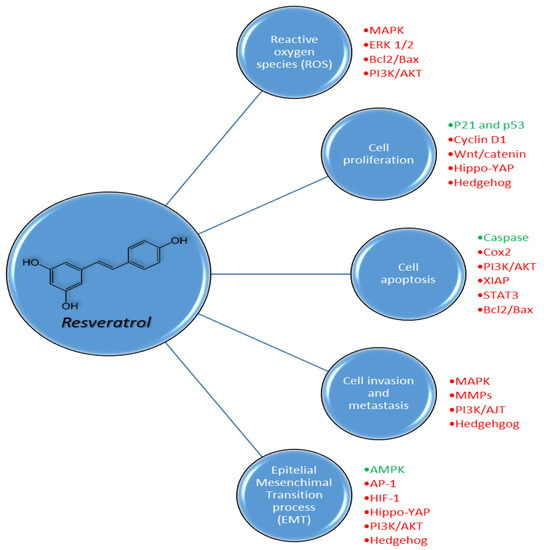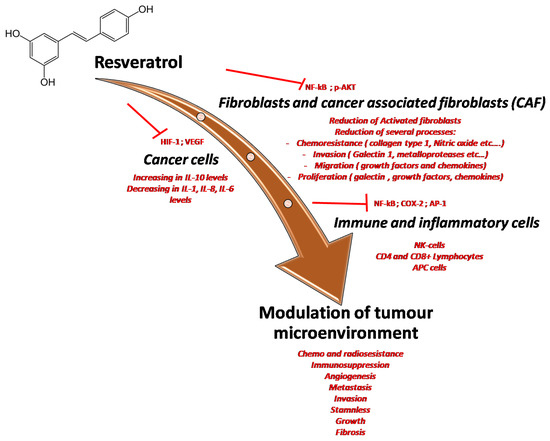
| Version | Summary | Created by | Modification | Content Size | Created at | Operation |
|---|---|---|---|---|---|---|
| 1 | Alessia Bignucolo | + 951 word(s) | 951 | 2020-04-26 10:46:26 | | | |
| 2 | Catherine Yang | Meta information modification | 951 | 2020-05-11 10:37:10 | | | | |
| 3 | Catherine Yang | -7 word(s) | 944 | 2020-10-29 04:10:59 | | |
Video Upload Options
Resveratrol (3,5,4′-trihydroxystilbene) is a natural phytoalexin that accumulates in several vegetables and fruits like nuts, grapes, apples, red fruits, black olives, capers, red rice as well as red wines. Being both an extremely reactive molecule and capable to interact with cytoplasmatic and nuclear proteins in human cells, resveratrol was studied in these years as complementary and alternative medicine (CAM) for the therapy of cancer, metabolic and cardiovascular diseases like myocardial ischemia, myocarditis, cardiac hypertrophy, heart failure. This review will describe the main biological targets, cardiovascular outcomes, physico-chemical and pharmacokinetic properties of resveratrol in preclinical and clinical models implementing its potential use in cancer patients.
1. Introduction
With almost 10 million deaths per year worldwide, cancer is a major public health problem, and it has become the second leading cause of death in Western countries [1]. Surgery, antiblastic chemotherapy (CT), target therapy (TT), immunotherapy and radiotherapy (RT) are the most common treatments for cancer. Antiblastic CT, TT, immunotherapy and RT are used as primary treatment approaches in most cancer patients and play vital roles in cancer treatment because many patients are diagnosed at advanced stages, compromising the option of surgery treatment [2]. However, more tumors have become resistant to CT, TT, immunotherapy and RT, which has become a major problem in cancer therapy. Furthermore, complications emerge when cancer cells develop chemoresistance and radioresistance via multiple mechanisms, and the CT agents and RT often cause adverse events [3]. Therefore, we need to identify a new strategy or new therapeutic agent that can overcome chemoresistance and radioresistance. A large number of natural products are considered to be effective anticancer drugs [4]. Most of them are found in fruit and vegetables, such as polyphenols and resveratrol [5]. These compounds have multiple effects in several chronic disease treatments, including cancer [4][5]. Resveratrol has been shown to regulate cellular growth in many human cancer cell lines [6]. Especially, its role in inducing growth inhibition, cell cycle arrest and apoptosis suggested the possibility to use resveratrol to prevent cancer (Figure 1) [7][8] A number of studies highlighted that this cell-growth modulating effect is both dose- and time-dependent [9][10]. However, the exact mechanism of these actions is not fully understood [4][10]. A high concentration of radical oxygen species (ROS) is found in cancer cells. ROS are a cornerstone in cancer onset and progression through the promotion of cell growth, immortalization and aberrant inhibition of locomotion and proliferation [11]. Resveratrol carries out its antioxidant properties through several mechanisms [11][12]. Especially, resveratrol modulates antioxidant enzymes such as superoxide dismutase, catalase and glutathione peroxidase [12]. Therefore, it induces cancer cell apoptosis by accumulation of hydrogen peroxide [12]. Resveratrol can also downregulate hypoxia-inducible factor-1α (HIF-1α) accumulation, leading to the suppression of fluorodeoxyglucose (F-FDG) uptake from metabolically active cells and glycolysis [13][14].
2. Tumor microenvironment
The tumor microenvironment (TME) is defined as the totality of normal cells, molecules and blood vessels surrounding and feeding each cancer cell [15]. TME cells are stromal cells, immune-inflammatory cells and vascular endothelial cells. Their interactions with each other and with the cancer cells through the secretion of cytokines and chemokines play a fundamental role in tumor initiation and progression [15]. As a matter of fact, a healthy TME protects against tumorigenesis [16]. On the contrary, disorders of the TME increase the levels of inflammatory cytokines, such as tumor necrosis factor α (TNF-α), promoting tumorigenesis through cell immortalization [16]. Moreover, TME governs chemo- and radio-resistance [17]. Therefore, targeting TME to defy cancer could be a winning strategy, both because of its involvement in tumorigenesis and the fact that it is less prone to mutate and rapidly cause metastatic events [17]. Cancer is characterized by a chronic inflammatory state, derived from the activation of both the immune and adaptive immune system cells present within the TME [15]. Thanks to its action on antioxidant enzymes and HIF-1α, among other effects, resveratrol has been proposed as a possible agent able to downregulate chronic inflammation in TME (Figure 2) [18]. In fact, resveratrol downregulates the production of inflammatory cytokines and increases the release of anti-inflammatory mediators by inhibiting AP-1 and NF-κB [19]. TME is a hypoxic environment, created by a rapid cancer cell growth and dysregulation of angiogenesis [18]. HIF-1α, a transcription factor regulating the expression of more than a hundred genes, is overly expressed during hypoxia, promoting more aggressive behaviors of the cancer such as chemo-resistance and metastatic spread [13][18]. As previously mentioned, resveratrol is able to modulate the expression of HIF-1α, thus reducing the fitness of TME to the expansion of the tumor [[18]. Modulation of HIF-1α leads to another important effect of resveratrol as an anti-tumor agent. Through downregulation of HIF-1α and increased expression of thrombospondin-1, resveratrol acts as an anti-angiogenic drug [18]. Resveratrol was also demonstrated to be able to interfere with the activation of some immune cells through the inhibition of the proliferation of both T and B lymphocytes and the downregulation of the expression of cluster of differentiation CD28 and CD80 on T-lymphocytes and macrophages, respectively [20]. A particular subset of macrophages, named tumor-associated macrophages (TAMs), are activated by cancer cells and promote the production of inflammatory cytokines through a STAT3 pathway. Resveratrol is able to decrease STAT3 activation in cancer [21]. In addition, resveratrol modulates the PI3K pathway in cancer cells, which downregulates CD8+ cytotoxic T cell activity. Therefore, by inhibiting PI3K, resveratrol enhances anti-cancer immunity [22].

Figure 1. Pleiotropic biochemical effects of resveratrol on reactive oxygen species (ROS), cell proliferation, cell apoptosis, cell invasion and metastasis and epithelial mesenchymal transition processes in cancer cells through the activation (green) or inhibition (red) of different pathways.

Figure 2. Multiple effects of resveratrol on the tumor microenvironment through the inhibition of many pro-inflammatory mediators and cytokines involved in cancer cell survival, in cancer-associated fibroblast activation and modulation of immune cells resident in tumor tissue.
References
- International Agency for Research on Cancer. Global Cancer Observatory. Available online: https://gco.iarc.fr/ (accessed on 2 March 2020).
- Kimberly D. Miller; Leticia Nogueira; Angela B. Mariotto; Julia H. Rowland; K. Robin Yabroff; Catherine M. Alfano; Ahmedin Jemal; Joan L. Kramer; Rebecca L. Siegel; Cancer treatment and survivorship statistics, 2019.. CA: A Cancer Journal for Clinicians 2019, 69, 363-385, 10.3322/caac.21565.
- Wang, X.; Zhang, H.; Chen, X.; Drug resistance and combating drug resistance in cancer. Cancer Drug Resist. 2019, 2, 141–160.
- Anna Lichota; Krzysztof Gwozdzinski; Anticancer Activity of Natural Compounds from Plant and Marine Environment. International Journal of Molecular Sciences 2018, 19, 3533, 10.3390/ijms19113533.
- Anwar Rayan; Jamal Raiyn; Mizied Falah; Nature is the best source of anticancer drugs: Indexing natural products for their anticancer bioactivity. PLOS ONE 2017, 12, e0187925, 10.1371/journal.pone.0187925.
- Jia-Ni Lin; Victor Chia-Hsiang Lin; Kun-Ming Rau; Po-Chuen Shieh; Daih-Huang Kuo; Jia-Ching Shieh; Wei J. Chen; Shih-Chang Tsai; Tzong-Der Way; Resveratrol Modulates Tumor Cell Proliferation and Protein Translation via SIRT1-Dependent AMPK Activation. Journal of Agricultural and Food Chemistry 2010, 58, 1584-1592, 10.1021/jf9035782.
- Dominique Vervandier-Fasseur; Norbert Latruffe; The Potential Use of Resveratrol for Cancer Prevention. Molecules 2019, 24, 4506, 10.3390/molecules24244506.
- Adi Y. Berman; Rachel A. Motechin; Maia Y. Wiesenfeld; Marina K. Holz; The therapeutic potential of resveratrol: a review of clinical trials. npj Precision Oncology 2017, 1, 35, 10.1038/s41698-017-0038-6.
- Jeong-Hyeon Ko; Gautam Sethi; Jae-Young Um; Muthu K Shanmugam; Frank Arfuso; Alan Prem Kumar; Anupam Bishayee; Kwang Seok Ahn; The Role of Resveratrol in Cancer Therapy. International Journal of Molecular Sciences 2017, 18, 2589, 10.3390/ijms18122589.
- Mohadese Honari; Rana Shafabakhsh; Russel J. Reiter; Hamed Mirzaei; Zatollah Asemi; Resveratrol is a promising agent for colorectal cancer prevention and treatment: focus on molecular mechanisms.. Cancer Cell International 2019, 19, 180, 10.1186/s12935-019-0906-y.
- Alarcón De La Lastra; I. Villegas; Resveratrol as an antioxidant and pro-oxidant agent: mechanisms and clinical implications. Biochemical Society Transactions 2007, 35, 1156-1160, 10.1042/bst0351156.
- Rosyana V. Albuquerque; Nívea S. Malcher; Lílian Lund Amado; Michael D. Coleman; Danielle C. Dos Santos; Rosivaldo Sa. Borges; Sebastião Aldo S. Valente; Vera C. Valente; Marta Chagas Monteiro; In Vitro Protective Effect and Antioxidant Mechanism of Resveratrol Induced by Dapsone Hydroxylamine in Human Cells. PLOS ONE 2015, 10, e0134768, 10.1371/journal.pone.0134768.
- Wei Li; Lei Cao; Xin Chen; Jianjun Lei; Qingyong Ma; Resveratrol inhibits hypoxia-driven ROS-induced invasive and migratory ability of pancreatic cancer cells via suppression of the Hedgehog signaling pathway. Oncology Reports 2015, 35, 1718-1726, 10.3892/or.2015.4504.
- Zhang, Q.; Tang, X.; Lu, Q.Y.; Zhang, Z.F.; Brown, J.; Le, A.D.; Resveratrol inhibits hypoxia-induced accumulation of hypoxia-inducible factor-1alpha and VEGF expression in human tongue squamous cell carcinoma and hepatoma cells. Mol. Cancer Ther. 2005, 4, 1465–1474.
- Dominique C. Hinshaw; Lalita A. Shevde; The Tumor Microenvironment Innately Modulates Cancer Progression.. Cancer Research 2019, 79, 4557-4566, 10.1158/0008-5472.CAN-18-3962.
- Wang, M.; Zhao, J.; Zhang, L.; Wei, F.; Lian, Y.; Wu, Y.; Gong, Z.; Zhang, S.; Zhou, J.; Cao, K.; et al.et al. Role of tumor microenvironment in tumorigenesis. J. Cancer 2017, 8, 761–773.
- Yao Yuan; Yu-Chen Jiang; Chongkui Sun; Qianming Chen; Role of the tumor microenvironment in tumor progression and the clinical applications (Review). Oncology Reports 2016, 35, 2499-2515, 10.3892/or.2016.4660.
- Youngjin Han; Hyuna Jo; Jae Hyun Cho; Danny N. Dhanasekaran; Yong Sang Song; Resveratrol as a Tumor-Suppressive Nutraceutical Modulating Tumor Microenvironment and Malignant Behaviors of Cancer. International Journal of Molecular Sciences 2019, 20, 925, 10.3390/ijms20040925.
- Jun-Li Luo; Shin Maeda; Li-Chung Hsu; Hideo Yagita; Michael Karin; Inhibition of NF-κB in cancer cells converts inflammation- induced tumor growth mediated by TNFα to TRAIL-mediated tumor regression. Cancer Cell 2004, 6, 297-305, 10.1016/j.ccr.2004.08.012.
- S. Sharma; K. Chopra; S. K. Kulkarni; J. N. Agrewala; Resveratrol and curcumin suppress immune response through CD28/CTLA-4 and CD80 co-stimulatory pathway. Clinical & Experimental Immunology 2006, 147, 155-163, 10.1111/j.1365-2249.2006.03257.x.
- Seung-Ho Baek; Jeong-Hyeon Ko; Hanwool Lee; Jinhong Jung; Moonkyoo Kong; Jung-Woo Lee; Junhee Lee; Arunachalam Chinnathambi; M.E Zayed; Sulaiman Ali Alharbi; et al.Seok-Geun LeeBum Sang ShimGautam SethiSung-Hoon KimWoong Mo YangJae-Young UmKwang Seok Ahn Resveratrol inhibits STAT3 signaling pathway through the induction of SOCS-1: Role in apoptosis induction and radiosensitization in head and neck tumor cells. Phytomedicine 2016, 23, 566-577, 10.1016/j.phymed.2016.02.011.
- Wei Li; Jiguang Ma; Qingyong Ma; Bin Li; Liang Han; Jiangbo Liu; Qinhong Xu; Wanxing Duan; Shuo Yu; Fengfei Wang; et al.Erxi Wu Resveratrol inhibits the epithelial-mesenchymal transition of pancreatic cancer cells via suppression of the PI-3K/Akt/NF-κB pathway.. Current Medicinal Chemistry 2013, 20, 4185-4194, 10.2174/09298673113209990251.




